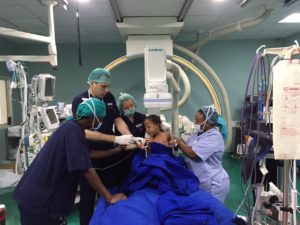by Ben Taylor
Health sector budget criticised
Health sector analysts and advocates took issue with the 2016/17 budget of the Ministry of Health, Community Development, Gender, Elderly and Children, as tabled by the Minister, Ummy Mwalimu, in parliament. The budget totals TSh 845bn (£300m), of which TSh 518bn was allocated to development expenditure and TSh 278bn for recurrent costs.
This represents a small overall increase on the Ministry’s 2015/16 budget, which totalled TSh 785bn, but analysts pointed out that under President Magufuli, two Ministries had been incorporated into one, with the Ministry of Health and Social Welfare having been merged with the Ministry of Gender, Women and Children.
The executive director of Sikika, a local health advocacy NGO, Irenei Kiria, said the budget would not help tackle a number of challenges facing the sector including shortage of drugs in health facilities. “The budget is not enough to significantly cut the drug shortage. The minister says TSh 251 billion from the development fund have been allocated to purchase medicine and other medical supplies but we should remember that the ministry also owes the Medical Stores Department about TSh 131 billion,” he said.
Meshack Mollel, the Advocacy and Resource Mobilisation manager for UMATI, an NGO dealing with sexual and reproductive health education, information and services, challenged the government to meet the Abuja Protocol that requires every country under the agreement to allocate at least 15% of its annual budget to the health sector. This means the budget should have been about TSh 4 trillion. “In this budget we should not expect any big things in the health sector,” he said.
Gloria Shechambo of the Tanzania Gender Network Program (TGNP) praised the decision to allocate more funds into development projects than the recurrent budget, but added that the key challenge was the timely release of funds by the Treasury. “The government’s plans to offer to Tanzanians universal health coverage should prompt improvement in financial allocations to the sector, otherwise the plans will remain a far-fetched dream,” she said.
First ever heart bypass survey in East Africa
The first ever heart bypass surgery in East Africa has been conducted in Tanzania, at the Jakaya Kikwete Cardiac Institute (JKCI).
A visiting team of doctors from BLK Hospital in New Delhi, India, and doctors from JKCI carried out the two-day joint exercise in May 2016, according to Head of the Cardiology Unit at the JKCI, Dr Peter Kisenge. Dr Kisenge told a news conference in Dar es Salaam that in those two days, his institute would help the country to save TSh 180m, the amount that would have been spent if the 18 patients had opted to travel outside the country for treatment.
“Performing a heart by-pass surgery costs TSh 27m for a single patient abroad and if a patient decides to undergo such surgery in Tanzania, he/ she will have to pay between TSh 8m and TSh 10m’’ he said.
The Indian hospital will provide training to doctors from Tanzania in New Delhi, and will regularly send teams from India to Tanzania to work with cardiologists at JKCI and to perform complicated surgeries.
“We are optimistic that the Tanzanian doctors will be able to learn more from us as we will similarly be able to learn as well from them through this partnership,’’ said Dr Subhash Chandra, the Chairman and Head of Cardiology Heart Centre at BLK Hospital.
Previously the JKCI carried out surgery using a heart lung machine that requires cardiologists to stop patients from breathing until the process is completed.
Missed targets on non-communicable disease
Tanzania has failed to meet targets set in 2011 to control and prevent chronic and non-communicable diseases (NCDs), according to a new report by the Tanzania Non-Communicable Diseases Alliance (TANCDA).
The missed targets include a 25% reduction in risks of premature mortality from cardiovascular, cancer, diabetes and chronic respiratory diseases, and a 30% reduction in tobacco use.
TANCDA Chairman, Dr Tatizo Waane told The Citizen that Tanzania has failed to meet the targets because NDCs receive fewer resources.

